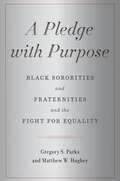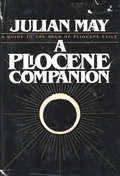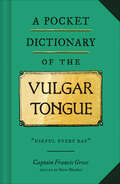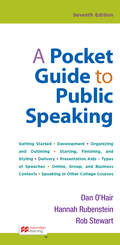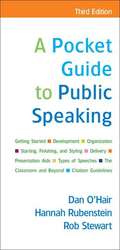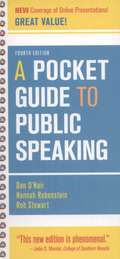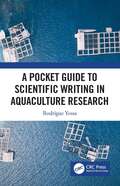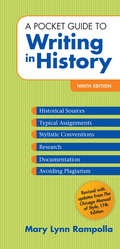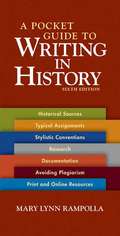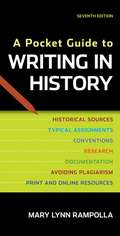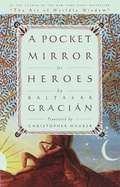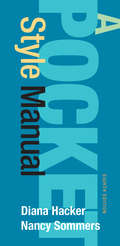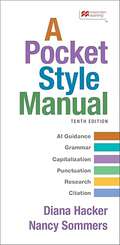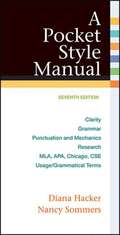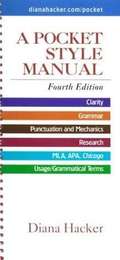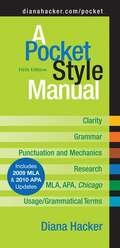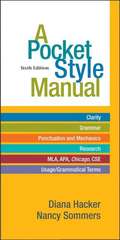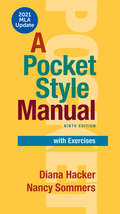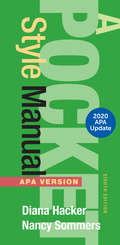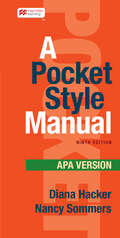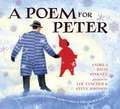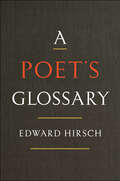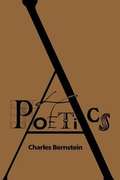- Table View
- List View
A Pledge with Purpose: Black Sororities and Fraternities and the Fight for Equality
by Matthew W. Hughey Gregory S. ParksReveals the historical and political significance of “The Divine Nine”—the Black Greek Letter OrganizationsIn 1905, Henry Arthur Callis began his studies at Cornell University. Despite their academic pedigrees, Callis and his fellow African American students were ostracized by the majority-white student body, and so in 1906, Callis and some of his peers started the first, intercollegiate Black Greek Letter Organization (BGLO), Alpha Phi Alpha. Since their founding, BGLOs have not only served to solidify bonds among many African American college students, they have also imbued them with a sense of purpose and a commitment to racial uplift—the endeavor to help Black Americans reach socio-economic equality. A Pledge with Purpose explores the arc of these unique, important, and relevant social institutions. Gregory S. Parks and Matthew W. Hughey uncover how BGLOs were shaped by, and labored to transform, the changing social, political, and cultural landscape of Black America from the era of the Harlem Renaissance to the civil rights movement. Alpha Phi Alpha boasts such members as Thurgood Marshall, civil rights lawyer and US Supreme Court Justice, and Dr. Charles Wesley, noted historian and college president. Delta Sigma Theta members include Bethune-Cookman College founder Mary McLeod Bethune and women’s rights activist Dorothy Height. Huey P. Newton, co-founder of the Black Panther Party, who left an indelible mark on the civil rights movement, was a member of Phi Beta Sigma, while Dr. Mae Jemison, a celebrated engineer and astronaut, belonged to Alpha Kappa Alpha. Through such individuals, Parks and Hughey demonstrate the ways that BGLO members have long been at the forefront of innovation, activism, and scholarship.In its examination of the history of these important organizations, A Pledge with Purpose serves as a critical reflection of both the collective African American racial struggle and the various strategies of Black Americans in their great—and unfinished—march toward freedom and equality.
A Pliocene Companion (The Saga of Pliocene Exile)
by Julian MayThe author of the acclaimed Pliocene Quartet offers an in-depth guide to a saga that &“has most closely matched J. R. R Tolkien's achievement&” (San Francisco Chronicle). With its richly imagined universe and large cast of finely-drawn characters, Julian May&’s Saga of Pliocene Exile has won devoted fans across the globe who find new layers, details, and ideas with each reading. In the words of Isaac Asimov's Science Fiction Magazine: &“Julian May has made a new and fresh masterwork in the genre and has irrevocably placed herself among the great of fantasy and science fiction.&” Covering all four novels—The Many-Colored Land, The Golden Torc, The Nonborn King, and The Adversary—this reading guideoffers a plot chronology, the author's original maps, a descriptive listing of all the characters, and three delightful interviews with May herself. Beyond that, it gives the reader a chance to explore further the surroundings of a world six million years in the past. The glossary gives information on metapsychology, on the futuristic science of the Galactic Milieu, and on the exotic world of the Tanu and Firvulag. In all, A Pliocene Companion is a must for followers of the Saga.
A Pocket Dictionary of the Vulgar Tongue
by Captain Francis GroseA profane guide to the slang from eighteenth-century London&’s backstreets and taverns and how to use the antique jargon and curse words in modern conversation. This slang dictionary gathers the most amusing and useful terms from English history and helpfully presents them to be used in the conversations of today. Originally published in 1785, A Classical Dictionary of the Vulgar Tongue was one of the first lexicons of English slang, compiled by a militia captain who collected the terms he overheard on his late-night excursions to London&’s slums, dockyards, and taverns. Now the legacy lives on in this colorful pocket dictionary. Learn the origin of phrases like &“birthday suit&” and discover slang lost to time An unexpected marriage of lowbrow humor and highbrow wit A Pocket Dictionary of the Vulgar Tongue is perfect for enlivening contemporary conversation with historical phrases; it includes a topical list of words for money, drunkenness, the amorous congress, male and female naughty bits, and so on. A funny book for wordplay, language, swearing, and insult fans, as well as fans of British humor and culture Perfect for those who loved How to Speak Brit: The Quintessential Guide to the King&’s English, Cockney Slang, and Other Flummoxing British Phrases by Christopher J. Moore; Knickers in a Twist: A Dictionary of British Slang by Jonathan Bernstein; and The Official Dictionary of Sarcasm by James Napoli
A Pocket Guide to Public Speaking
by Dan O'Hair Rob Stewart Hannah RubensteinO’Hair, A Pocket Guide to Public Speaking is a student success guide to public speaking in an abbreviated, easy-to-use format.
A Pocket Guide to Public Speaking (2nd edition)
by Dan O'Hair Rob Stewart Hannah RubensteinBased on the highly successful Speaker's Guidebook, A Pocket Guide to Public Speaking offers all of the material typically covered in a full-sized text -- from invention, research, and organization to practice and delivery -- in a concise format perfect for any course across the curriculum or day-to-day setting.
A Pocket Guide to Public Speaking (3rd edition)
by Dan O'Hair Rob Stewart Hannah RubensteinThis best-selling brief introduction to public speaking offers practical coverage of the material typically covered in a full-sized text -- from invention, research, and organization to practice and delivery -- in a concise format perfect for any setting across the curriculum, on the job, or in the community.
A Pocket Guide to Public Speaking (Fourth Edition)
by Dan O'Hair Rob Stewart Hannah RubensteinThe book has tools needed to prepare and deliver a wide range of speeches and presentations covering all steps necessary to create a speech-from planning, research, and development to organization, practice, and delivery.
A Pocket Guide to Scientific Writing in Aquaculture Research
by Rodrigue YossaWriting for a high-quality scientific aquaculture publication is challenging, and many students and early career aquaculture scientists find the task daunting. Expanding on his popular workshop on Improving Scientific Writing at the 2017 World Aquaculture conference, Rodrigue Yossa provides new researchers with all the tools they need to write abstracts and a variety of articles (original, research reports, magazines, working papers, conference proceedings and more). He also takes the reader step-by-step through the process of reviewing submitted manuscripts and replying to reviewers, as well as understanding research ethics. Each section is accompanied by examples, and attention is focused on providing advice on grammar, how to focus your paper and possible loopholes when writing. A Pocket Guide to Scientific Writing in Aquaculture Research offers a lifeline to aquaculture students and early career researchers getting a grasp on the basics of science communication through writing.
A Pocket Guide to Writing in History
by Mary RampollaA Pocket Guide to Writing in History is a brief, inexpensive, and easy-to-use guide to the writing and research skills needed for undergraduate history courses. Its concise yet comprehensive coverage of every step of the research and writing process--including detailed advice on documenting sources and avoiding plagiarism--have made A Pocket Guide to Writing in History the trusted choice in history.
A Pocket Guide to Writing in History (6th edition)
by Mary Lynn RampollaA portable and affordable reference tool, A Pocket Guide to Writing in History provides reading, writing, and research advice useful to students in all history courses. Concise yet comprehensive advice on approaching typical history assignments, developing critical reading skills, writing effective history papers, conducting research, using and documenting sources, and avoiding plagiarism -- enhanced with practical tips and examples throughout -- have made this slim reference a best-seller. Now in its sixth edition, the book offers more coverage of working with sources than ever before.
A Pocket Guide to Writing in History (7th Edition)
by Mary Lynn RampollaAn essential writing, reading, and research tool for all history students, A Pocket Guide to Writing in History offers a best-selling combination of concise yet comprehensive advice in a portable and accessible format. This quick-reference guide provides a practical introduction to typical history assignments, exercising critical reading skills, evaluating and documenting sources, writing effective history papers, conducting research, and avoiding plagiarism. Building on its time-tested approach, the seventh edition offers expanded, hands-on guidance for writing and researching in the digital age, and additional coverage on working with primary and secondary sources.
A Pocket Mirror for Heroes
by Christopher Maurer Baltasar GracianA Pocket Mirror for Heroes is a mirror because it reflects "the person you are or the one you ought to be." It is a pocket mirror because its author took the time to be brief. And it is a mirror for heroes because it provides a vivid image of ethical and moral perfection to which all can aspire. The Art of Worldly Wisdom by Baltasar Gracian was all but forgotten for three hundred years, until its republication in 1992 turned this lost classic into a New York Times bestseller. Now Gracian, the Spanish Jesuit considered Machiavelli's better in strategy and insight, sets a new standard on the art of living and the practice of achieving. That new standard is the art of heroism--how to be "the consummate person, ripe and perfect: accurate in judgment, mature in taste, attentive in listening, wise in sayings, shrewd in deeds, the center of all perfection."Gracian teaches the reader to be "a giant"--"the greatest person possible, a miracle of perfection, a king." Wit, wisdom, courage, elegance, grace, humility, spontaneity--these are the qualities needed to reach heroism in any occupation. But it is not enough to be wise or graceful: one must learn as well how to manage that talent, how to distinguish a quality fiom its shadow. A Pocket Mirror for Heroes provides "a politics for governing oneself, a compass for sailing toward excellence, an art for reaching distinction with just a few rules of discretion," and it will be wise and witty company for anyone who recognizes--and relishes--the challenges of daily life.
A Pocket Style Manual
by Diana Hacker Nancy SommersYour students need clear, complete answers to their questions about research, writing, and grammar--and they often need them at a moment's notice. As their teacher, you are their greatest resource, but you can't be available 24/7. For help with work in class and at home and especially for questions at odd hours, students can turn to A Pocket Style Manual. The thoughtfully revised seventh edition makes it even easier for students to effectively and independently address their writing and research challenges. With 325 documentation models in four styles and coverage of drafting thesis statements, writing correctly and effectively, finding and evaluating sources, and writing research papers, A Pocket Style Manual supports writers across the disciplines. Our newest set of online materials, LaunchPad Solo, provides all the key tools and course-specific content that you need to teach your class. The LaunchPad Solo for A Pocket Style Manual includes exercises, sample student writing, and LearningCurve game-like adaptive quizzing. To package LaunchPad Solo free with A Pocket Style Manual, use ISBN 978-1-319-01282-3.
A Pocket Style Manual
by Diana HackerA Pocket Style Manual gives you quick answers and expert advice for writing assignments in any course or work setting, including coverage of grammar, style, citing sources, and writing responsibly with AI.
A Pocket Style Manual (2016 MLA Update Edition)
by Diana Hacker Nancy SommersThe thoughtfully revised seventh edition makes it even easier for students to effectively and independently address their writing and research challenges.
A Pocket Style Manual (5th Edition, 2009 MLA Update)
by Diana HackerThe first of its kind, A Pocket Style Manual continues to help student writers get answers to their writing and research questions. Its concise and straightforward content is flexible enough to suit the needs of writers in the humanities, social sciences, sciences, health professions, business courses, fine arts, teacher training courses, and beyond. With its signature Diana Hacker quick-reference features, A Pocket Style Manual has always provided quick solutions to writing problems. Supplemented by the best free and open Web resources, A Pocket Style Manual offers the best value for students. In the Hacker tradition, the new contributing authors -- Nancy Sommers, Tom Jehn, Jane Rosenzweig, and Marcy Carbajal Van Horn -- have crafted solutions for the challenges today's college students face. Together they give us a new edition that provides more help with research writing and one that works better for a wider range of students.
A Pocket Style Manual (6th Edition)
by Diana Hacker Nancy SommersUsed by nearly a quarter million students each year, A Pocket Style Manual is a straightforward, inexpensive quick reference, with content flexible enough to suit the needs of writers in the humanities, social sciences, sciences, health professions, business, fine arts, education, and beyond. Its slim format, brief length, and spiral binding make it easy for students to keep A Pocket Style Manual with them for every writing assignment, in any class. With its signature Hacker handbook quick-reference features--hand-edited sentences, color-coded documentation coverage, user-friendly index entries, and a clean, uncluttered design--A Pocket Style Manual has always provided fast, effective answers to writing and research questions. In the Hacker tradition, new coauthor Nancy Sommers has crafted solutions for the challenges today's college students face. The new edition provides even more help with research writing and supports students in every discipline.
A Pocket Style Manual (Seventh Edition)
by Diana Hacker Nancy SommersThe thoughtfully revised seventh edition makes it even easier for students to effectively and independently address their writing and research challenges. With 325 documentation models in four styles and coverage of drafting thesis statements, writing correctly and effectively, finding and evaluating sources, and writing research papers, A Pocket Style Manual supports writers across the disciplines.
A Pocket Style Manual with Exercises, with 2021 MLA Update
by Diana Hacker Nancy SommersThis ebook has been updated to provide you with the latest guidance on documenting sources in MLA style and follows the guidelines set forth in the MLA Handbook, 9th edition (April 2021).How do I fix a comma splice? How do I cite a Youtube video? No matter your question or the writing project, A Pocket Style Manual with Exercises has the answers. With its quick, easy-to-find explanations and plenty of examples--including full model papers and more than 200 documentation models--this book will become your go-to guide in your English class, the rest of college, and even your career.
A Pocket Style Manual, APA Version
by Diana Hacker Nancy SommersBecoming a college writer means becoming a college researcher, and it can be a challenge for students to keep all of the guidelines and best practices straight for each class. Enter A Pocket Style Manual, APA Version. The eighth edition—with its emphasis on step-by-step how-to instruction that helps students apply writing, research , and citation advice in practical, transferable ways—is a powerful companion for writing in all disciplines. What’s more, it covers all aspects of writing in APA style, including over 100 APA documentation models and 11 sample student papers in diverse genres, from a literature review to a laboratory report to a professional memo. With Pocket’s new research help, tested and trusted grammar and style advice, and digital tools that make practice, tracking, and grading simple, you’ve got the most powerful pocket guide for college writing and research.
A Pocket Style Manual, APA Version
by Diana Hacker Nancy SommersAt-a-glance help for writing in APA StyleHacker/Sommers’ A Pocket Style Manual, APA Style, 9th edition offers quick, authoritative writing advice in an affordable and portable handbook. Whether you need guidance on grammar or help documenting in APA, this handbook has the answers you need.
A Poem for Peter: The Story of Ezra Jack Keats and the Creation of The Snowy Day
by Rosemary Wells Andrea Davis Pinkney Steve Johnson Lou Fancher<p>A celebration of the extraordinary life of Ezra Jack Keats, creator of The Snowy Day. <p>The story of The Snowy Day begins more than one hundred years ago, when Ezra Jack Keats was born in Brooklyn, N.Y. The family were struggling Polish immigrants, and despite Keats's obvious talent, his father worried that Ezra's dream of being an artist was an unrealistic one. But Ezra was determined. By high school he was winning prizes and scholarships. Later, jobs followed with the WPA and Marvel comics. But it was many years before Keats's greatest dream was realized and he had the opportunity to write and illustrate his own book. <p>For more than two decades, Ezra had kept pinned to his wall a series of photographs of an adorable African American child. In Keats's hands, the boy morphed into Peter, a boy in a red snowsuit, out enjoying the pristine snow; the book became The Snowy Day, winner of the Caldecott Medal, the first mainstream book to feature an African American child. It was also the first of many books featuring Peter and the children of his -- and Keats's -- neighborhood. <p>Andrea Davis Pinkney's lyrical narrative tells the inspiring story of a boy who pursued a dream, and who, in turn, inspired generations of other dreamers.</p>
A Poet's Glossary
by Edward HirschA major addition to the literature of poetry, Edward Hirsch’s sparkling new work is a compilation of forms, devices, groups, movements, isms, aesthetics, rhetorical terms, and folklore—a book that all readers, writers, teachers, and students of poetry will return to over and over. Hirsch has delved deeply into the poetic traditions of the world, returning with an inclusive, international compendium. Moving gracefully from the bards of ancient Greece to the revolutionaries of Latin America, from small formal elements to large mysteries, he provides thoughtful definitions for the most important poetic vocabulary, imbuing his work with a lifetime of scholarship and the warmth of a man devoted to his art.Knowing how a poem works is essential to unlocking its meaning. Hirsch’s entries will deepen readers’ relationships with their favorite poems and open greater levels of understanding in each new poem they encounter. Shot through with the enthusiasm, authority, and sheer delight that made How to Read a Poem so beloved, A Poet’s Glossary is a new classic.
A Poetics
by Charles BernsteinThis collection is considered to be more than a work of criticism by the poet Charles Bernstein, it is a poetic intervention into criticism. Artifice of Absorption, a key essay, is written in verse, and its structures and rhythms initiate the reader into the strength and complexity of the argument.
